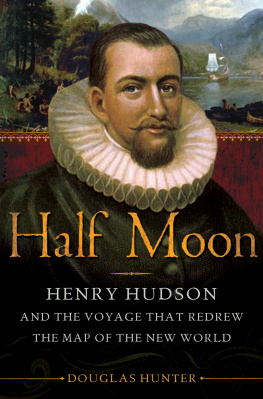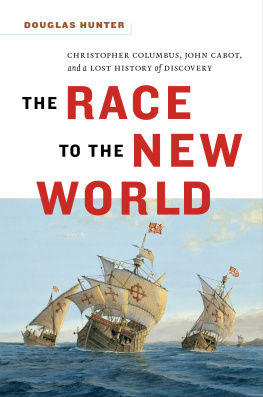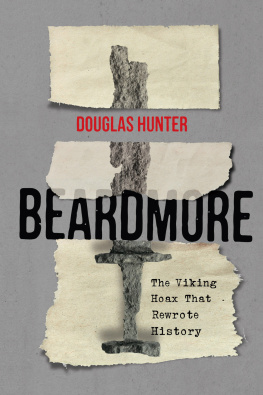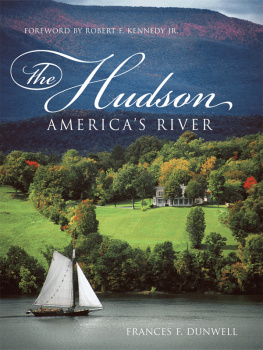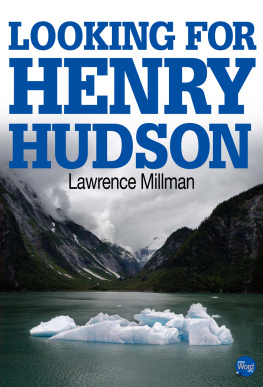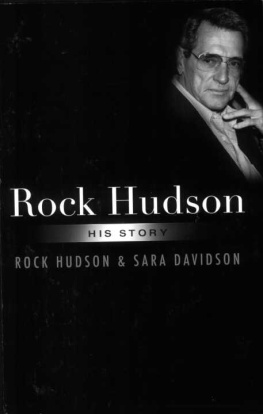HALF MOON
_________________
Henry Hudson and
the Voyage That Redrew the
Map of the New World
DOUGLAS HUNTER

Copyright 2009 by Douglas Hunter
Maps 2009 by Douglas Hunter
All rights reserved.
You may not copy, distribute, transmit, reproduce, or otherwise make available this publication (or any part of it) in any form, or by any means (including without limitation electronic, digital, optical, mechanical, photocopying, printing, recording, or otherwise), without the prior written permission of the publisher. Any person who does any unauthorized act in relation to this publication may be liable to criminal prosecution and civil claims for damages. For information address Bloomsbury USA, 1385 Broadway, New York, NY 10018.
Published by Bloomsbury Press, New York
Bloomsbury is a trademark of Bloomsbury Publishing Plc
LIBRARY OF CONGRESS CATALOGING-IN-PUBLICATION DATA
Hunter, Doug, 1959
Half moon: Henry Hudson and the voyage that redrew the map of the New World / Douglas Hunter.1st U.S. ed.
p. cm.
Includes bibliographical references.
1. Hudson, Henry, d. 1611. 2. AmericaDiscovery and explorationDutch. 3. Half Moon (Ship) 4. ExplorersAmericaHistory17th century. 5. Nederlandsche Oost-Indische Compagnie. 6. Hudson River Valley (N.Y. and N.J.)Discovery and exploration. I. Title. II. Title: Henry Hudson and the voyage that redrew the map of the New World.
E129.H8H866 2009
910.92dc22
2009000642
eISBN: 978-1-60819-176-5
First U.S. Edition 2009
This electronic edition published in 2009
To find out more about our authors and books visit www.bloomsbury.com. Here you will find extracts, author interviews, details of forthcoming events and the option to sign up for our newsletters.
To voyagers everywhere
Contents
This book began taking shape in 2003 and followed a course almost as circuitous as Henry Hudsons in the Half Moon.
I was planning to write about the Laurentian Shield and its role in the history and culture of Canada. One chapter would deal with early exploration, and I decided to use as a thematic rallying point the lost astrolabe of Samuel de Champlain, a showcase holding of the Canadian Museum of Civilization. Researching the history of that astrolabe produced the first of many unexpected turns. The provenance of the device where Champlain was concerned was iffy at best, and I ended up writing a cover feature for the Beaver, Canadas national history magazine, on why Jesuit missionaries were a much better fit as its owners.
Explaining the provenance issue also required me to investigate why Champlain was traveling on the Ottawa River in the summer of 1613, when he supposedly lost the astrolabe. It turned out he was making a harrowing journey into uncharted territory, in hope of both reaching the Northern Sea and collecting from an Algonquin people called the Nebicerini an English boy they were holding captive. The Discovery mutiny of 1611 on James Bay was the only possible source of the boy, as John Hudson had been cast away in a shallop with his father, Henry, and seven other Englishmen and had never been seen since.
While Champlain did not find the boy (and its never been entirely clear that the captive youth ever existed), the story was irresistible. The book about the Laurentian Shield was itself cast away, as I wrote instead the story of the traumatic convergence in the careers of Hudson and Champlain. Three years of research and writing produced Gods Mercies, which was published by Doubleday Canada in 2007.
Along the way, I conducted more than enough research to write an entire biography of Hudson, covering all four of his known voyages. Before Gods Mercies was published I began making plans to that end. But it was the prequel voyage to the final, fatal one of 161011, which I wrote about in detail in Gods Mercies, that especially intrigued me. The 1609 Half Moon voyage was as strange and at times as tragic as the Discovery venture. And it also had the distinction of laying the groundwork for the founding of the great city of New York. Early in 2008, I telescoped the plan to write a full biography and began writing the book you now have in your hands. I had dealt with the 1609 voyage tangentially in Gods Mercies, which meant that in some aspects of the story, I would be revisiting familiar terrain. I expected some amount of retelling of what I had coveredthe basic facts about Sir Thomas Smythe and Robert Juet, for example. But it soon became clear that, as much research as I had performed in the previous three years, there was still more to do, in digesting new materials, revisiting the sources I already had, and deciding what it all meant.
When I lecture on the craft of narrative nonfiction, I stress that writing history requires an imagination. By that I do not mean the skill or nerve to make things up. Rather, it is the ability to sift through available evidence, however thin at times, and see patterns, connections, and possibilities. And the new book provided a fresh opportunity to think hard about what the evidence was trying to tell me. That was especially true of the remarkable letter written by Thomas Holland, mayor of Dartmouth, to Sir Robert Cecil after Holland met Hudson and debriefed him on where he had just been on the Half Moon voyage and what he was planning to do next. That encounter was a prelude to events in Gods Mercies. Now, it was both an aftermath to the Half Moon voyage and a crucial bit of evidence in fathoming Hudsons motivations. I had pondered those motivations in Gods Mercies, but for this new work I was able to bring the evidence into much clearer focus.
I also changed my mind about something Id already written in GodsMercies, which thankfully was a minor fact in that work, but a major one in the new book. I had accepted the conclusions of earlier writers that Hudsons first landfall in the Half Moon was around the Georges River in what is now Maine. Viewed in isolation, the Georges River did seem a good fit. But as I now had the time and the writing space to properly dissect the 1609 voyage and the journal entries of Robert Juet, I realized that his account was impossible to reconcile with a passage from the Georges River to the Half Moons next landfall, Cape Cod. The evidence instead clearly was pointing back from Cape Cod to Nova Scotias south shore, to the area around Liverpool and La Havesomething I believe my friend the scholar Conrad Heidenreich tried to tell me while I was researching Gods Mercies, but it had failed to sink in.
The deductive process was an interesting lesson in working with historical narrative and required a slew of hydrographic charts with soundings to compare to those recorded by Juet in order to come to a satisfactory answer. The voyage essentially had to be reverse-engineered, starting with a known landfall, at Cape Cod, and working backward to see where the trail of evidence led. Having settled on La Have as Hudsons first landfall, I was then able to trace the voyage back to an uncomfortably close encounter with Sable Island. The voyage record for that leg, from the first encounter with the Grand Banks to the arrival at La Have, is at times confusing and difficult to reconcile with cartographic references, but this only underscored for me what a confusing and difficult time Hudson was having in making his way safely through substantially uncharted waters.

